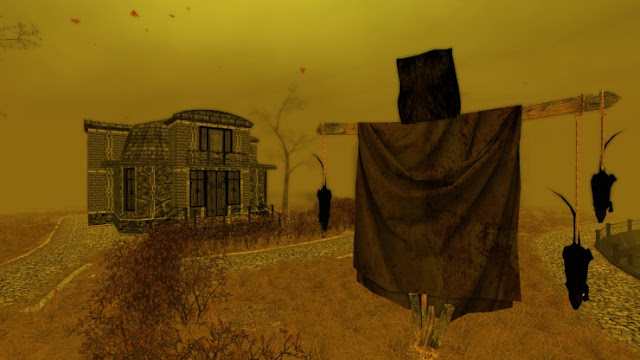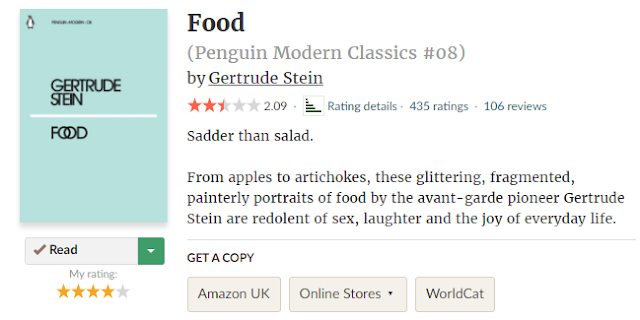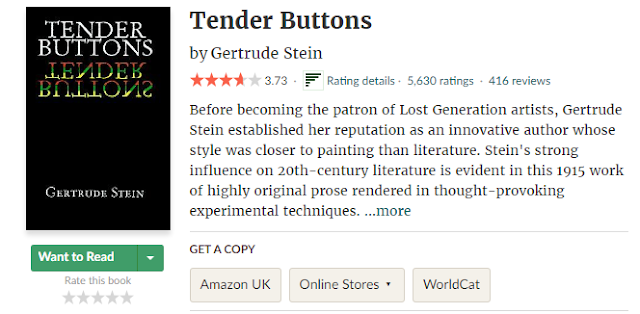Last year, when trying to figure out what to read, I decided to go through some of the Penguin Modern classics I'd bought for like a quid each. I hadn't got round to reading them so I decided to give it a go. They usually have essays or short stories or poetry from different authors to give you taste of what their work is like. Gertrude Stein was one of these authors.
 |
| Source: Foyles |
What I realised from reading her book from this collection, Food, is that I love Gertrude Stein. In the book were short poems about various types of food. There is a poem in there called 'Rhubarb' which insists that the vegetable is both susan and not susan at the same time. This might not mean anything to anyone and I'm not sure it means anything to me. But the kind of work where the meaning isn't immediately obvious just seems to click with me.
Stein worked within modernism and, as Deb Jannerson states, a process called 'automatic writing', where you essentially just write out your stream of consciousness, was 'an integral part of Stein’s process'. The point, at least from my perspective is not to understand what is happening in the poems but to experience the absurdity of a brain's unconscious thoughts. The confusion. The bewilderment. The final concession that you have no clue what's going on. And then you get to a place where you can just enjoy the words. How they sound. What it feels like to say them out loud in succession, and the reaction you might have if you were to say any of these words to another person.
I get it because I don't get it and I'm not trying to.
However, people on Goodreads did not have the same reaction as me.
I think when a piece of work as part of a box set like this, you run the risk of introducing people to things they would probably have no opinion on otherwise. Stein's work on Goodreads, outside of this, is pretty highly rated and well-respected, but the people reading her work outside of this probably sought her out and didn't have her thrust upon them as part of 50 book collection. In fact, as Jannerson states, works from Stein, like her book Tender Buttons, are cited as the 'literary answer to Cubism and a feminist take on a male-dominated movement'.
When going into something more avant-garde, you have to acknowledge that the piece of work, whatever it is, is not trying to make you comfortable. What the avant-garde and experimental expects, as suggested by the YouTube channel Little Art Talks, is for the audience to view its work in relation to conventional art, to challenge the rigid ideas of form and structure that we are used to, to ask us to intentionally confront traditional schools of thought.
It's not trying to woo you or make you sad, at least not in the traditional sense. It's trying to force you to reflect on why it is you feel comfortable in certain structures of art, literature, film, and even society. Why do you need a linear narrative? Why do you need complex characters? Why do these words in a certain order make sense but the rhubarb poem doesn't? Why has it been structured in this way?
I would say that mainstream audiences are probably more accepting of more experimental cinema than they are of experimental literature. That's me painting with very broad strokes but I just think visual mediums are more accessible than written ones. Directors like David Lynch draw attention to the form of the cinema as much as possible so that the audience is aware of the constructedness of entertainment in general. The first time I felt personally impacted by this was when I watched his horror web series Rabbits (2002), where we see a family of rabbits attempting to communicate with one another as extremely odd things happen around them. Attempting satirise the sitcom as well as the family unit, the disjointed dialogue and tin laughter make what is happening on screen terrifying, added to by the fact that the audience is watching giant rabbits exist as humans would. As the podcast Twin Peaks Unwrapped discussed, everything about what is happening is designed to prevent the audience from becoming comfortable with the action on screen, with no illusion of reality whatsoever. Unlike Classical Hollywood cinema, avant-garde cinema seeks a more 'expressive and emotional' relationship with its audience, rather than a 'rational' one, as Bill Nichols says. He goes on to state that with these films, it is the 'experiential relationship between the viewer and the screen' that is prioritised over the 'metaphorical relationship between a story world and the actual world'.
 |
| Source: Taste Of Cinema |
Generally, people like to watch/read/experience art that they are going to enjoy. I don't think anyone walks into something wanting to hate it. People have their preferences and use art for escapism. But it does posit the question: is it necessary for every piece of art to be enjoyable?
I think part of this curiosity comes from the fact that most films are made for the purpose of profit, no matter what creative team is behind them. If a film doesn't do well financially, it's seen as a flop. In order to make the most money, film companies have to produce cinema that will appeal to the widest audience possible. However, in appealing to everyone and seeking to test no one's boundaries, some films (and by some, I mean a lot) end up being wholly unmemorable. I haven't watched a Marvel film in years and it was specifically because they all seemed to blend together into one generic bad time. When everything is the same, then there is nothing to gain by going to this art for escapism. If I've seen one, I've seen them all.
One thing I know is that you need to be made to have these 'what the actual fuck did I just watch' moments every now and again. When I think of why I've come to view art this way, this Nichols quote come to mind:
‘[Poetic films] require empathetic understanding on their own terms and conditions. Since these films seldom make an argument, attempt to arrive at a known truth, or tell a straightforward story, their impact is more oblique than works that adhere to logical, rhetorical, or narrative form, but this impact can be quite profound or disturbing. The viewer’s social assumptions and viewing expectations may be thrown into question. Poetic films are works that are meant to be rather than to mean, which is another way of saying that the experience and impact of the actual work, qualities highly dependent on form, take precedence over thematic interpretation.’
Here's the thing: you don't have to like a piece of work to understand what it's doing and to acknowledge that it should in fact exist. I cannot stand the film Pink Flamingos (1972). I absolutely hate it, bar a few fun scenes. But I know that it needed to exist, what it did for cinema and for its queer cast members. Cited by Mark Chalan Smith as being a 'camp-trash epic', Pink Flamingos follows Divine, a woman attempting to be crowned the filthiest person alive. As Lindsay Hallam asserts, John Waters was attempting to turn the transgressive and often offensive acts that were portrayed on screen by the characters as 'joyful celebrations of childlike revelry'. What I learned through my research of this film, is the impact it has had for queer people, especially queer fat people. The podcast Girls, Guts & Giallo discusses this film's resistance of the gaze towards fat people and how it portrayed a kind of freak camaraderie, where those who were seen as filthy outsiders by heteronormative society embraced the labels they were given and took them to their most extreme. Even with all this, I still hate it.
Will I watch it again? Probably! Because it's a fascinating film that's really fucking gross.
 |
| Source: Cole Smithey |
I watched a very good video essay by the YouTube creator hbomberguy that touched on how I feel about this kind of work in a very articulate way. This video is about the game Pathologic, a game he insists that you do not play because not only is it not fun but it's tedious and difficult and not worth it at all. However, he is able to talk about its merits, how it plays with the video game format, how it forces you to unlearn what you may know about games, about how you think of the characters themselves. He makes the argument that it is not essential for a game to be good for it have value and for it to be worthy of talking about in an intellectual setting, even arguing that it is a more interesting game to discuss than to play. Rather than creating a traditional RPG, the game poses as one and convinces the player that this is not a game you are trying to complete or succeed at; rather you are made to experience what it would be like to be person trying to outrun what is trying to kill you, slowly becoming the opposite of heroic fantasy. What this does, he argues, is it recontextualise what players might expect from a video game, where the player is punished for trying to do what would usually be standard in this kind of game.
 |
| Source: GodisaGeek |
That's kind of how I feel about most experimental art. Some will really speak to me. Some I get nothing from. Some I have violently shut off, thrown away, buried in my back garden. But each has evoked some kind of emotion from it. Each has asked me to look why I did or didn't like it. Each has asked me not to just consume something and then dispose of it, but really look at how it compares to the rest of the artistic landscape.
I think there is a lot of value in not trying to work out what something means, but instead looking at how a piece of work made you feel. If it was unenjoyable, then that might actually be a function of the text and not in fact an error.
*
Thank you for reading this post! I have linked a playlist of videos that helped me with my research on this topic so if you'd like to learn a bit more, feel free to check it out. If you enjoyed it, please consider donating to my Ko-fi. It's a one time donation of £1 and it would really help me out x
Sources:
Bill Nichols, Engaging Cinema: An Introduction To Film Studies (New York: W.W. Norton & Company, 2010).
‘David Lynch’s Rabbits’, Twin Peaks Unwrapped <https://open.spotify.com/episode/1Nyxs6goWM2iRA84F46HN2si=33Uyp9EQTNGCbmHMnZbqB> [accessed 10/02/2021]
Deb Jannerson, ‘Adventures in Feministory: Gertrude Stein’, BitchMedia <https://www.bitchmedia.org/post/feministory-gertrude-stein> [accessed 10/02/2021]
Lindsay Hallam, ‘Monster Queen: The Transgressive Body of Divine in Pink Flamingos’, Bright Lights <https://brightlightsfilm.com/monster-queen-the-transgressive-body-of-divine-in-pink-flamingos/#.X_cC2Nj7TIV> [accessed 10/02/2021]
Mark Chalan Smith, ‘‘Pink Flamingos’: Cult of Bad Taste’, LA Times <https://www.latimes.com/archives/la-xpm-1992-04-02-ol-91-story.html> [accessed 10/02/2021]
'Pathologic is Genius, and Here's Why', hbomberguy <https://www.youtube.com/watch?v=JsNm2YLrk30&list=PLaGIkGWlfb3AApKh4efiq3845LUDgVrmv&index=5> [accessed 10/02/2021]
'Significance of Avant-garde | Art Terms', Little Art Talks <https://www.youtube.com/watch?v=7hqzexxZqRc&list=PLaGIkGWlfb3AApKh4efiq3845LUDgVrmv&index=1> [accessed 10/02/2021]








